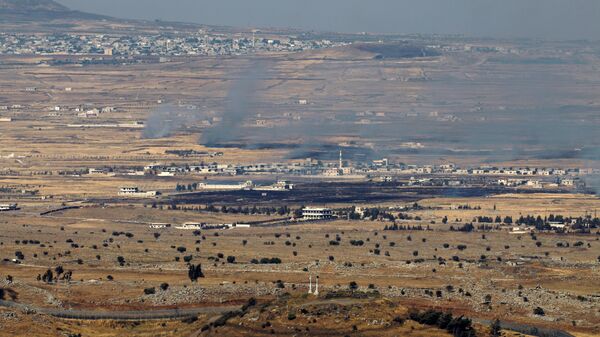On Iran’s Military 'Presence' in Syria
Commenting on a recent statement by Israeli Prime Minister Benjamin Netanyahu that Tel Aviv would not tolerate Tehran’s military presence in Syria, Kedmi emphasized that the country wants neither Iran nor pro-Iranian Shiite groups’ present on Syria’s soil. At the same time, according to the analyst, this rhetoric also serves the domestic agenda.
"The goal is to find a threat to distract public attention from domestic issues and from the complicated situation Netanyahu and his supporters have found themselves in. But Tel Aviv really doesn’t want Iranian military bases in Syria. But I think there is a little chance that it is possible despite Tehran’s intention to do so," Kedmi told Sputnik Serbia.
On UNESCO
In October, the US announced its withdrawal from UNESCO, with Tel Aviv following in Washington’s footsteps. According to Kedmi, the actions by the two countries were not coordinated and Trump used "UNESCO’s anti-Israel position" to promote his own policy.
"However, the situation has changed since then and Israel is now in a complicated situation. The organization is now headed by a Jewish woman who served as culture minister in France. She’s unlikely to continue UNESCO’s openly anti-Israeli policy," Kedmi said.
On Relations With Russia and the US Over Syria
According to Kedmi, Israel and Russia maintain contacts on the situation on Syria via two channels.
"We’re not talking about what the both countries agree on. Neither Russia nor Israel is interested in a confrontation over Syria. Thus, our contacts are focused on preventing on this technical issue, on preventing clashes between our military forces," he said.
The other issue Israel is discussing with Russia is the situation in Syria after the war ends.
"Russia’s influence in the Middle East and on the future political process in Syria is expanding and Israel wants his message to be heard by Russia. Tel Aviv wants any armed Shia groups out of Syria after the end of the conflict. Israel’s interest is to prevent any threat to its security from Syria. As for the other processes in Syria, it is for the Syrian people to decide," the analyst said.
Kedmi also stressed that Israel is not balancing between the US and Russia when it comes to the situation in Syria because Tel Aviv has no official position toward the conflict.
"Israel is only interested in preventing threats to its security and doesn’t meddle in other issues concerning Syria. Tel Aviv never supported anti-Damascus, pro-American, pro-Turkish or any other forces. This is our policy and we’re not meddling in the situation in Syria. Washington may not like that but there is no balancing between the US and Russia," he pointed out.
On the Situation in the Gaza Strip
Kedmi made a cautious assumption, saying that normalization cannot be ruled in the future.
"The recent events show that despite opposition from both sides we’re moving toward the resolution of the crisis. First of all, I’m talking about the reconciliation between Hamas and Fatah and the restoration of autonomy in the Gaza Strip. Some say that the US, Egypt and Saudi Arabia was behind this, which increases the chance of the conflict being settled," he said, adding that those recent efforts would bring near the day when all parties involved will sit down at the negotiating table.
On Attitude Toward Russian President Putin in Israel
According to the analyst, the attitude toward Russia and its leadership in Israel is affected by the fact that Israeli people are often misinformed by media about Moscow’s foreign policy and the Russian president.
"But there are some very important factors that should not be ignored, including Russian-speaking people in Israel, [Russian President Vladimir] Putin’s friendly policy toward Israel and the recent events in Syria. As a result, the attitude to Russia and the Russian president in Israel is better than in Europe," Kedmi said.
On the West Jerusalem Problem
Kedmi pointed out that in April 2016, Russia recognized West Jerusalem as Israel’s capital, a move that was proposed by US President Donald Trump, but Washington has not yet done that.
"No other country did it. For the last 20 years, the US president has vowed to recognize West Jerusalem as the capital of Israel but nothing has been done. What Putin did is beyond the understanding and capabilities of American policymakers," he said.

